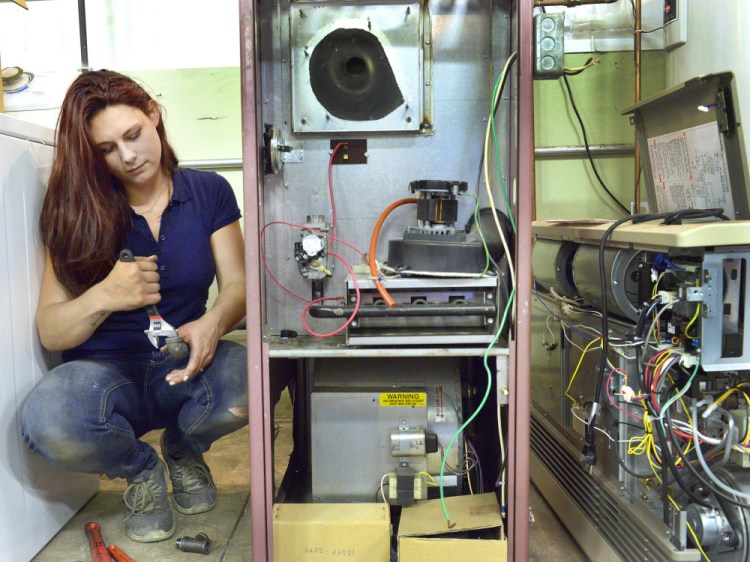In the weeks leading up to the Bucksport paper mill closure in 2014, Verso worker Curtis Hamilton realized he needed to change careers.
The 34-year-old Belfast resident did some research and decided that his best option was to join the growing industry that installs and repairs heating, ventilation and air-conditioning systems.

Trevor Rollins, 28, left, discusses options for venting a furnace with senior instructor Bryan Champagne. Rollins already works in HVAC and enrolled at
the technical center to take specific courses to expand his areas of expertise.
But Hamilton had no prior experience in the field known as HVAC, so with financial help from a state program, he enrolled in a three-month crash course at a Brunswick school funded in part by Maine energy companies.
Four weeks before his graduation in May 2015, Hamilton already had a job lined up with Maritime Energy in Montville, about 18 miles from his home.
“I was working for Maritime about two weeks after I finished school,” he said.
For Maine workers in declining industries, it can be difficult to find a new career with comparable pay that doesn’t require years of college. The challenge is even greater for those living in rural communities.
But since 2004, the Maine Energy Marketers Association has been operating a school in Brunswick to train workers in HVAC job skills. Graduates can obtain certifications to install, maintain and repair oil, electrical, propane and natural gas heating systems, as well as air-conditioning and refrigeration systems.
According to the U.S. Department of Labor, the HVAC industry is poised for “extremely high” job growth of 14 percent over the coming decade, making it an ideal second career for displaced workers in declining industries such as forest products.
“Companies right now are looking for new apprentices to bring into the trade,” said Bryan Champagne, senior instructor at the Maine Energy Marketers Association’s Technical Education Center.
The school, known as MTEC, graduated about 400 students in 2015, said Jamie Py, president of the association. Roughly one-third of those graduates were referred to the school by the state Department of Labor’s Career Centers and Rapid Response programs for displaced workers from other industries.
HVAC jobs are desirable because they offer relatively high wages without requiring a four-year college degree. According to the U.S. Labor Department’s Bureau of Labor Statistics, the mean annual wage for HVAC workers in the U.S. is $47,830.
And most importantly, HVAC companies in Maine are hiring.
“If someone has an HVAC license, they can pretty much go out and find another job right now,” said Ed Upham, director of the Maine Department of Labor’s Bureau of Employment Services.
Upham, who oversees the state Career Centers and Rapid Response program for displaced workers, said MTEC is one of several state-approved schools for worker retraining. In addition to HVAC, other common career moves for former mill workers include health care, information technology, and precision machining and manufacturing.
“A lot of it depends on where you live,” Upham said. “If you live in the Portland area, obviously your opportunities are a lot more diverse.”
In most cases, workers in Maine who have been laid off because of a facility closure can get the cost of their job retraining partly or fully subsidized by the state. Hamilton said the cost of his $8,500 MTEC tuition, tools and living expenses were fully covered through Rapid Response and another program for veterans.
Upham said the most important criterion for the Department of Labor’s approved schools list is the school’s ability to help place graduates in a new career. On that score, he said, MTEC has an excellent track record.
“The whole purpose of these programs is re-employment, so there has to be a job at the end of it,” Upham said.
Other students enrolled in MTEC said they are seeking a better-paying career with greater opportunities for advancement.
Brunswick resident Sara Myers was working in day care when she decided to enroll in the school. Now, with two weeks left until graduation, she already has job interviews lined up.
Although she had no prior HVAC training before enrolling in MTEC, the 22-year-old Myers said it seemed like a good fit for her interests.
“Ever since I was little, I’ve always liked working with my hands,” she said.
Other MTEC students, including 28-year-old Trevor Rollins, already work in HVAC and are taking specific courses to expand their areas of expertise. Rollins, who works for Branch Brook Fuels in Arundel, said he is licensed in oil heating systems but came to MTEC to learn propane systems and appliances.
“It gives you the basics,” Rollins said. “The company is paying me to attend.”
Hamilton said the three-month course at MTEC is intense and requires students to study hard and learn quickly. He said it could easily be expanded to six months with all of the material that is covered.
Still, he said those willing to put in the effort will acquire the foundation they need to go out and train as apprentices in HVAC. It’s a challenging but rewarding career, he said.
“You’re going to be working long hours, weekends,” he said. “The colder it is, the more you work.”
Send questions/comments to the editors.



